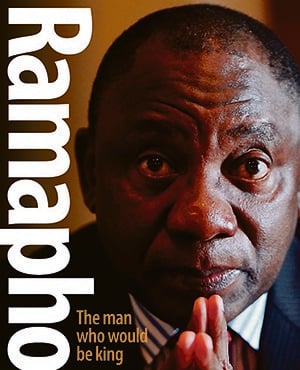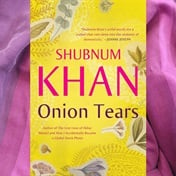
In this extract from his new book on Cyril Ramaphosa, journalist and editor Ray Hartley examines the deputy president’s role in the slaughter of striking mine workersat Marikana in August 2012, an event that heavilyaffected his reputation and image.
Ramaphosa: The man who would be king by Ray Hartley
Jonathan Ball Publishers
222 pages
R179 at takealot.com
What was Cyril Ramaphosa’s role in the events at Marikana? Did he egg the government on to act with violence against the strikers? Had he abandoned his lifelong humanism and concern for workers in favour of a more arrogant – even violent – attitude to defend his business interests?
Driven by Julius Malema, this narrative soon gained momentum. Ramaphosa’s reputation suffered its greatest damage, even as he was planning a return to the political stage. With the ANC’s Mangaung conference approaching in December, there was already talk that he had been offered the deputy presidency on Jacob Zuma’s slate, and his political foes fell on the Marikana events like hyenas. So prominent was the criticism of Ramaphosa that the Farlam commission devoted an entire chapter of its report (chapter 19: Mr Cyril Ramaphosa) to his role in the incident. The chapter began with an outline of the links between Ramaphosa and Marikana. Ramaphosa had exchanged emails with Lonmin personnel between 11 and 15 August 2012: “They recorded that Mr Ramaphosa had conversations relating to the events at Marikana which are being investigated by the commission with the then minister of police Mr Nathi Mthethwa and with the minister of mineral resources, Ms Susan Shabangu.”
Advocate Dali Mpofu, counsel for the injured and arrested persons, seized on a phrase used by Ramaphosa in an email encouraging a more effective security force response to the strike. Ramaphosa had described the strikers as criminals and had called for “concomitant action” to be taken. Mpofu argued that the emails were evidence of “concerted pressure that was being put, among others, on the police – well firstly on the government not to call the strike a strike or not to call it labour related but to call it so-called criminal action and that was a platform from which it would be easier to inflict violence on strikers”.
The essence of the argument was that there was a causal connection between Ramaphosa’s statements and the killing of strikers by police.
Mpofu argued that Ramaphosa’s intervention “triggered a series of events which determined the timing of the massacre. He knew exactly what he was doing and he is the cause of the Marikana massacre, as we know it. It was demonstrated that he has a case to answer on 34 counts of murder and many counts of attempted murder as well as intent to do grievous bodily harm.”
Ramaphosa’s response was to argue that he had not anticipated that the police would shoot the strikers, and that he certainly did not support this action, which he wholeheartedly condemned. He described how he had been made aware of the strike on the Saturday preceding the Thursday massacre. He had been told by Thibedi Ramontja, the director-general of the department of mineral resources, that a “terrible and distressing situation had developed at Marikana which had resulted in the violent deaths of two Lonmin security officers with attacks and disruptions continuing”.
There were fears that the killing of security officers and others would escalate because, without a greatly increased police presence, the violence could not be contained. Ramaphosa had been told by Ramontja that “at this stage, it is clear that probably only a massive police and possibly army presence will stop us having a repeat of recent past experiences or nearby, we simply do not have the capability to protect life and limb and I urge you to please use your influence to bring this over to the necessary officials who have the resources at their disposal. We need help.”
Ramaphosa was horrified at the prospect of more killings while the police dragged their feet. He sent a text message to Nathi Mthethwa that afternoon. The minister phoned him back two hours later and they had a five-minute conversation: “He testified that during that conversation he raised the concern that Mr [Albert] Jamieson [chief commercial officer of Lonmin] had raised, that people had died and were dying and that the situation was getting worse. He mentioned that Mr Jamieson had requested that the police presence be increased so as to prevent further loss of life. He informed the minister that the situation he had been told about on the ground was ‘such that they need help, they need more police presence on the ground’.”
Ramaphosa was adamant that he did not suggest what steps should be taken and that he had only communicated concern over the unfolding violence and the need for some action to be taken. Ramaphosa’s view was borne out by Mthethwa, who testified: “I spoke to ... Mr Ramaphosa, who had called earlier, or had left a message and I then returned the call. He explained to me that the situation in Marikana is bad. I’m not quoting his exact words, but he says he’s concerned because people are dying there, property is being damaged there and as far as he can see there are no police, or adequate police on the ground.”
After hearing of further violence, Ramaphosa spoke with Mthethwa once more. In that conversation, he “stressed that they should immediately take steps to ensure that they protect life and property and bring those responsible for the terrible acts of violence and deaths to book.” Before the commission, Ramaphosa explained what he had meant: “When I said that they should be brought to book, I had anticipated and expected that those who were responsible would be identified and they would be arrested, which is what I expect the police to do normally in pursuing their tasks and duties. It occurred to me that where these incidents had occurred, one got the full details thereof, police presence was either absent or very minimal and that is why I felt these people were being attacked and being killed in the way they were.”
Mthethwa testified that Ramaphosa had told him that he did not think that what was unfolding was “pure industrial action in the true sense of the word: it had criminality on it and violence”. In an email to Albert Jamieson on the eve of the shooting, Ramaphosa wrote that “all government officials need to understand that we are essentially dealing with a criminal act. I have said as much to the minister of safety and security.”
Ramaphosa’s interest in the policing of the Marikana strike was communicated to the police: “Lieutenant General Mbombo said that she received a telephone call from minister Mthethwa on the evening of 12 August in which the minister told her that he had received a report from Mr Ramaphosa, asking if he knew about what was happening at Marikana and stating, ‘this appears to be a problem, he should please look carefully at it’.” She had later taken this to mean that the minister was being “pressurised” by Ramaphosa.
On the Monday before the shooting, Ramaphosa received a further email telling him that the death toll had risen to four. He also spoke to the mineral resources minister, Susan Shabangu, and had summarised this conversation in an email to a Lonmin manager: “I called her and told her that her silence and inaction about what is happening at Lonmin was bad for her and the government. She said that she was going to issue a statement. She was going to be in Cape Town to attend a joint parliamentary session and would be back in Johannesburg later today to attend to the Lonmin matter. I told her that I would also be in Cape Town and suggested that we should have a discussion and see what she needs to do.”
In his evidence, Ramaphosa elaborated: “The discussions I had with minister Shabangu, who was then the minister of mineral resources, were that the situation at Lonmin was deteriorating, more and more people were getting killed and injured, and that was a matter of great concern to me because I knew how this type of situation can just escalate into more and more violence and I was saying that we need to make sure that at a government level we sensitise people so that the minister of police can be of assistance and deploy more police who can protect life and property.”




 Publications
Publications
 Partners
Partners











